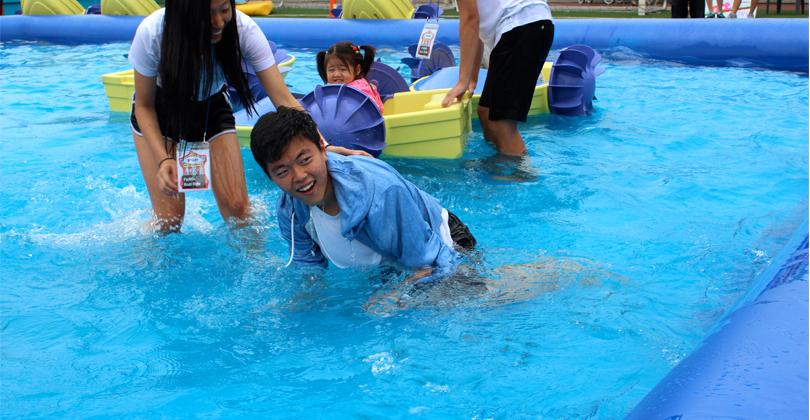High school students in uniform white shirts glance at their phones to check the time, and then soon hurry off to their next shifts. When they arrive, they wear the nametags for their respective booths and prepare themselves for the work lying ahead. The sixth annual Family Fun Day, a traditional fall festival that allows students to take their minds off of academics and bond with their families and friends, took place on Sept. 12. The event is organized annually by the High School Parent Group (HSPG) and features various attractions, such as food, games, and music. This year, the HSPG decided to regulate the event more strictly by increasing the level of supervision and involvement with clubs’ funding.
Implemented a few years ago, the system of distributing booths to high school clubs is a combination of both a draw and a deliberate allocation. The bigger booths, as they required more students to run, were assigned to clubs with more members, while the rest of the booths were distributed randomly among the smaller clubs.
“The method of random and deliberate distribution was very effective and fair because there was no room for any favoritism or unfair advantages to certain clubs,” said Sky Park (10), Global Issues Network executive. “Although some booths may seem more popular than others time to time, at the end of the day everyone visits each booth at least once, so the end results [depend on] how hard the club members work every shift.”
However, this system of distribution led many students not exerting as much effort as expected. To combat this issue, a new system of evaluation and supervision was implemented: HSPG members visited booths throughout the day, assessing each club’s booth quality. According to Jung-won Han, HSPG member, the supervising system was brought into action to ensure that students would clean up properly after themselves and that club executives would be more responsible in supervising their club members.
The HSPG members made note of the attendance of volunteers, the smoothness of each shift, the effort put into the station posters, and the quality of the booth’s cleanup. At the end of the day, the HSPG members gave each club a final score at the end of the day. This score affected the funding that club would receive in the future; clubs with higher scores received more money, whereas clubs with lower scores were given less funds.
“The new supervision was brought in because the HSPG concluded that a club should receive the amount of money they deserve, nothing more and nothing less,” said Shota Ono, senior vice president. “This evaluation system factors out the size and popularity of the club or booth, leaving only the effort and dedication aspect of the club members to decide their funding, both of which the HSPG deemed as paramount traits.”
As this system directly influenced each and every club, there had been a lot of controversy surrounding the additional supervision. Some were discontented, saying that the additional supervision was unnecessary and just created tension, while other club members showed a more positive reaction to the new changes.
“I found Family Fun Day much more organized and efficient that it has ever been in the past,” said Bethany Ko (12), president of Green Club. “I liked how the HSPG members’ supervision was able to keep clubs as a whole and students individually accountable for the responsibilities they had during shifts in order for everyone involved to have a safe and enjoyable day.”

